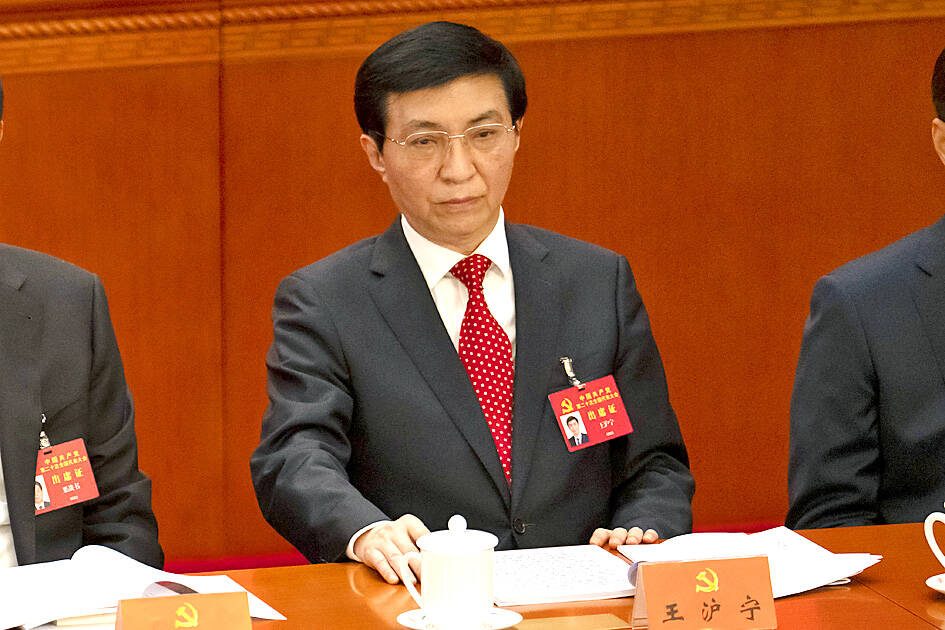Chinese President Xi Jinping (習近平) is aware that Beijing’s treatment of Hong Kong has weakened any possible sentiment for a “one country, two systems” arrangement for Taiwan, and has instructed Chinese Communist Party (CCP) politburo member Wang Huning (王滬寧) to develop new ways of defining cross-strait relations, Japanese news magazine Nikkei Asia reported on Thursday.
A former professor of international politics at Fu Dan University, Wang is expected to develop a dialogue that could serve as the foundation for cross-strait unification, and Xi plans to use the framework to support a fourth term as president, Nikkei Asia quoted an anonymous source as saying.
Wang is thought to be the principal force behind the CCP’s messaging campaigns. He has been credited with developing former Chinese leader Jiang Zemin’s (江澤民) guiding sociopolitical programs while he was CCP general secretary, and is said to have crafted former Chinese president Hu Jintao’s (胡錦濤) scientific development policies before designing and executing many of Xi’s social ideals.

Photo: AP
The “one country, two systems” formula that granted a degree of autonomy to the Hong Kong Special Administrative Region was first developed by the former Chinese leader Deng Xiaoping (鄧小平), and it was believed to be the CCP’s intention to use Hong Kong’s framework as a template for a peaceful unification with Taiwan.
The CCP’s leaders are aware that China’s increasingly tough stance with Hong Kong has become a powerful argument for Taiwanese to demonstrate that the system would be unworkable in Taiwan, the report said.
However, Xi feels at liberty to break from Deng’s policy to develop his own peaceful unification framework, it said.
The report quoted a source familiar with CCP internal affairs as saying that an armed invasion of Taiwan is not being considered by Beijing, and is focused on plans to unify Taiwan diplomatically.
Success of the new concept would be gauged before Beijing considered military options, the source said.
Cross-strait tensions that have been heightened since August last year make it difficult to determine when Beijing might finish developing its new framework, the source added.

Alain Robert, known as the "French Spider-Man," praised Alex Honnold as exceptionally well-prepared after the US climber completed a free solo ascent of Taipei 101 yesterday. Robert said Honnold's ascent of the 508m-tall skyscraper in just more than one-and-a-half hours without using safety ropes or equipment was a remarkable achievement. "This is my life," he said in an interview conducted in French, adding that he liked the feeling of being "on the edge of danger." The 63-year-old Frenchman climbed Taipei 101 using ropes in December 2004, taking about four hours to reach the top. On a one-to-10 scale of difficulty, Robert said Taipei 101

Nipah virus infection is to be officially listed as a category 5 notifiable infectious disease in Taiwan in March, while clinical treatment guidelines are being formulated, the Centers for Disease Control (CDC) said yesterday. With Nipah infections being reported in other countries and considering its relatively high fatality rate, the centers on Jan. 16 announced that it would be listed as a notifiable infectious disease to bolster the nation’s systematic early warning system and increase public awareness, the CDC said. Bangladesh reported four fatal cases last year in separate districts, with three linked to raw date palm sap consumption, CDC Epidemic Intelligence

US climber Alex Honnold left Taiwan this morning a day after completing a free-solo ascent of Taipei 101, a feat that drew cheers from onlookers and gained widespread international attention. Honnold yesterday scaled the 101-story skyscraper without a rope or safety harness. The climb — the highest urban free-solo ascent ever attempted — took just more than 90 minutes and was streamed live on Netflix. It was covered by major international news outlets including CNN, the New York Times, the Guardian and the Wall Street Journal. As Honnold prepared to leave Taiwan today, he attracted a crowd when he and his wife, Sanni,

Taiwanese and US defense groups are collaborating to introduce deployable, semi-autonomous manufacturing systems for drones and components in a boost to the nation’s supply chain resilience. Taiwan’s G-Tech Optroelectronics Corp subsidiary GTOC and the US’ Aerkomm Inc on Friday announced an agreement with fellow US-based Firestorm Lab to adopt the latter’s xCell, a technology featuring 3D printers fitted in 6.1m container units. The systems enable aerial platforms and parts to be produced in high volumes from dispersed nodes capable of rapid redeployment, to minimize the risk of enemy strikes and to meet field requirements, they said. Firestorm chief technology officer Ian Muceus said